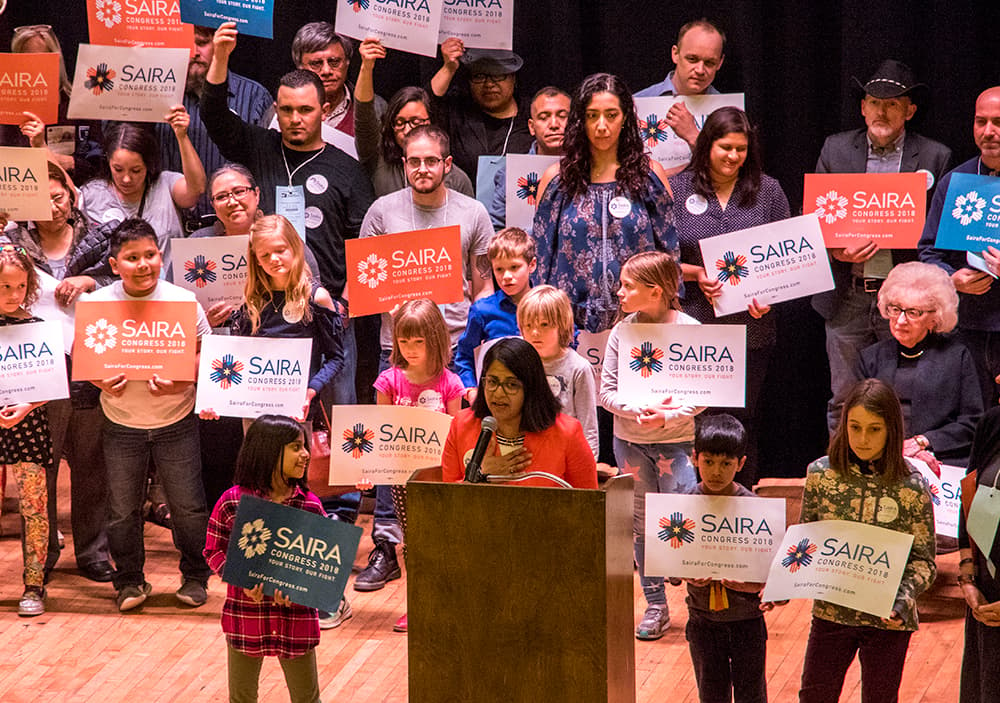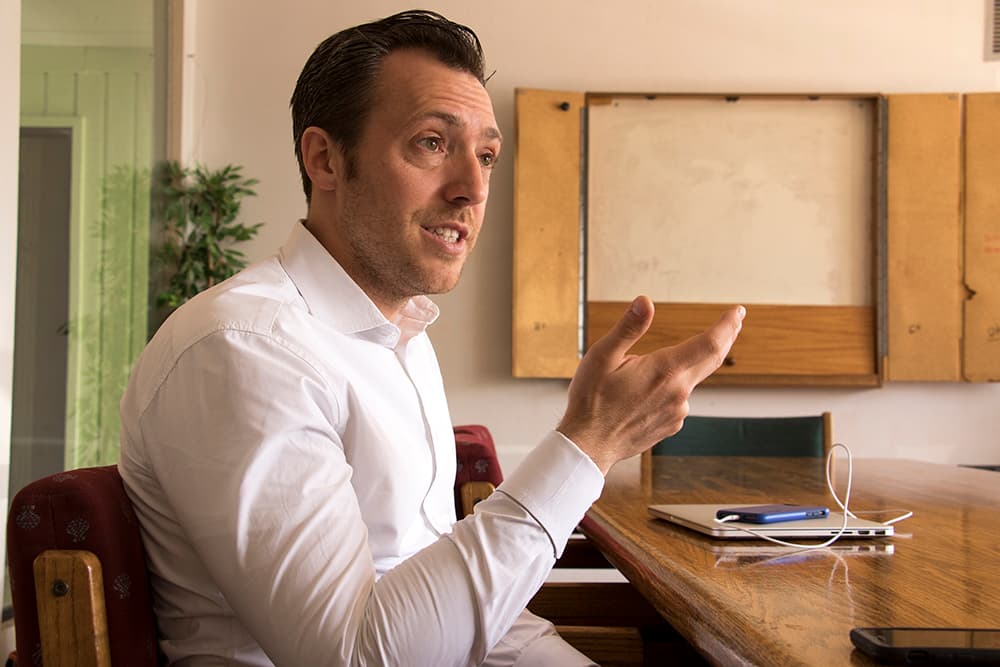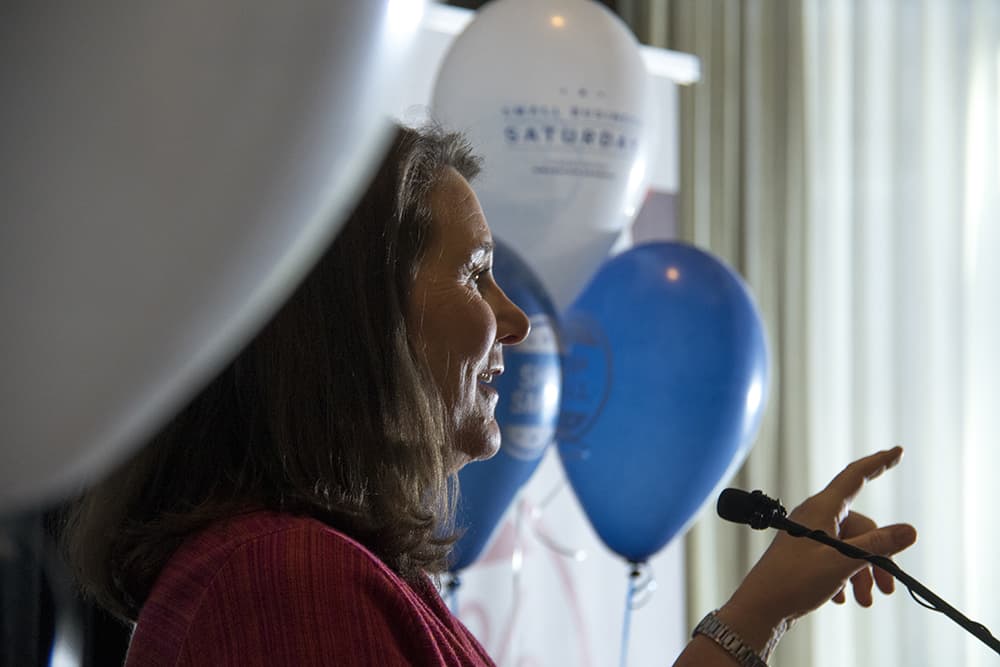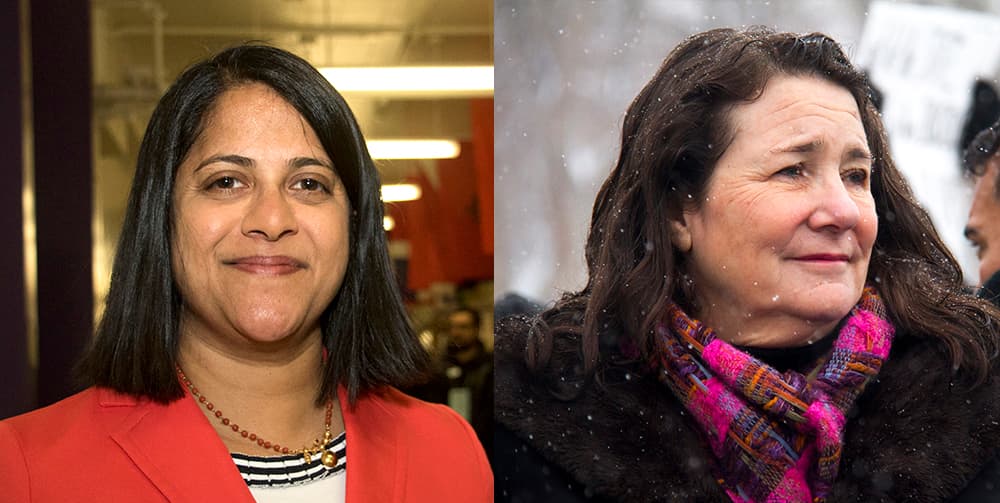
Saira Rao’s foray into politics has mostly gone as planned. She knew challenging 11-term incumbent U.S. Rep. Diana DeGette for the 1st Congressional District Democratic nomination wouldn’t be easy.
Rao, a former attorney who co-founded a children’s book publishing company said she’s faced an assortment of thinly-veiled attempts to discredit her campaign and push her platform aside since announcing.
That race and a primary in the 6th Congressional District are putting on display the blue fault lines within the Democratic Party.
The latest example Rao provides happened last weekend, during a State House District 9 meeting.
An email sent out by the district and provided by Rao's campaign shows only DeGette was given a speaking opportunity during a primary candidates forum. While the state district fall within the CD1 boundaries, only DeGette was listed as a speaking candidate.
After Rao's campaign pointed this out, the committee organizers invited her the day before the event. But Rao decided not to go because it was such short notice. Rao said the party has gone out of its way to put up “institutional roadblocks” and treat her like “a second-class citizen.”
"It's constantly this, 'You should be grateful for what you have,'" Rao said.
Together with Levi Tillemann’s complaints against the Democratic Congressional Campaign Committee in CD6, it raises the question of whether the Democratic Party has moved on from its 2016 divisions as it hopes to ride its “blue wave” to this fall's election.
“Those wounds still are raw,” Tillemann said. “What I tend to talk about is the fact that I did support Bernie, and I contributed to his campaign, and I was inspired by Bernie.”
Tillemann added he volunteered for Clinton's campaign after she won the party’s nomination.
Rao, though, was a Clinton supporter. She bills herself as a progressive who's running to help get the party back to its roots and to ensure the party has a robust primary process. There are areas where Rao said she differs from DeGette, including her supporting a single-payer healthcare system and keeping corporate money from politics (DeGette last year cosponsored a bill supporting single-payer health care). She also said she got into the race because it's time for new leadership.
"We keep electing these same people over and over again. It's obviously rigged in their favor," Rao said.
DeGette, in contrast, has previously questioned support for single-payer healthcare and has taken donations from PACs.
There were also allegations during the 1st Congressional District Assembly in Denver suggesting Rao’s campaign was contacting delegates and telling them to stay home. (Both candidates qualified onto the primary.) One accuser was former CD1 candidate David Sedbrook, who posted about it on his Facebook page and alluded to the rumor while he introduced DeGette, who he endorsed after dropping out of the race.
Metro State University associate political professor Robert Preuhs said its not unusual for party insiders to prefer some candidates over others, but they're often more subtle in their support. Party insiders can end up deciding to throw their support behind the candidate with the best shot of winning.
"In a lot of ways, yeah it happens, (and) the costs are relatively low for the party. The only real cost is a lack of voter enthusiasm among supporters for candidates who they feel were unfairly treated by the party during the primary process," Preuhs said.
"The reality is that the party's trying to win an election and party insiders are seeking to do that too," Preuhs said.
DeGette said she’s not sure why her opponent would suggest the party makes it difficult for non-incumbent or well-known candidates to participate. She pointed out that Rao, who doesn’t have prior experience holding public office, qualified onto the ballot both by amassing enough delegates in the party’s assembly and by submitting enough petitioning signatures.
She said she hasn’t seen any examples of the party making life difficult for Rao. And that didn’t have any knowledge of Rao’s campaign calling delegates ahead of last month’s assembly, saying that the CD1 assembly turned out great.
“I don’t think it’s constructive to sit around talking about the process,” DeGette said.
“The way I look at it is we live in a democracy,” DeGette added. “People have the right to run in an election.... I welcome that as an opportunity to have a debate on the issues and also to highlight the leadership I have shown representing the 1st Congressional District.”
But in the 6th, they're making national headlines.
Last week, The Intercept published a story featuring a secret audio recording provided by Tillemann, a former member of the Obama Administration, featuring himself and Hoyer, the House Minority Whip from Maryland. Hoyer can be heard in the recording attempting to tell Tillemann last December to drop out of the CD6 race. In it, Hoyer says the Democratic Congressional Campaign Committee, which is the campaign arm of Democrats running for U.S. House, would be backing Tillemann’s opponent, Jason Crow.

That CD6 seat is currently held by U.S. Rep. Mike Coffman, a Republican. The race is considered a toss-up, so it’s one Democrats are focusing on in hopes of flipping it in during fall elections.
“The Democrats have a golden opportunity for a slam dunk in 2018 and all we need to do is fight for truth, fight for policies that benefit working-class families, fight for democracy -- and we’ll win,” Tillemann said. “But the DCCC and Washington insiders are so intent on putting their finger on the scale that they risk blowing it. And that’s a huge problem.”
In response to Denverite questions, Crow 's campaign issued a statement saying he was proud of the positive and inclusive campaign he had run. Right now, Crow, a former U.S. Army Ranger, appears to be the more popular candidate, having earned 64 percent of delegates during the CD6 Assembly last month. Tillemann, who's running on a heavily anti-Trump platform, earned 35 percent. Both like to tout their deep Colorado roots.
"I'm proud of the positive and inclusive campaign we have run and it's reflected in our strong grassroots support,” Crow said in his statement. “From county commissioners, to our state representatives, to our overwhelming victory at assembly, it's clear that the 6th is ready for new leadership that is focused on moving us forward, not divisive political games. I look forward to fighting for the people of the district and we will be ready to take our seat back in November."
Hoyer wasn't the only high-profile Democrat Tillemann spoke with while mulling his run. He also met with DeGette.
DeGette said Tillemann was one of several people she met with who were interested in running for the CD6 nomination. The meetings are standard practice and give new candidates an opportunity to introduce themselves to party leaders. Tillemann said he also met with U.S. Rep. Jared Polis (whom he referred to as a “gentleman”), while Rao's campaign confirmed Rao also met with DeGette about running for her seat.
DeGette didn't seem interested in discussing the Tillemann meeting with Denverite; when asked if the meeting had been cordial, DeGette declined to answer yes or no. A DeGette campaign spokesperson said DeGette told Tillemann she saw her role as a senior Democrat as someone who should stay neutral and ensure races stayed positive.
But Tillemann said his conversation last summer with DeGette had some similarities with the conversation he had with Hoyer.
“It didn’t go well,” Tillemann said, before continuing, “It ended rather abruptly at her discretion.”
DeGette said she doesn’t think it’s appropriate for the DCCC to be involved in “weighing in” on candidates, which she expressed to the committee. She said she hasn’t endorsed any candidate in the race and that Hoyer’s suggestion that Colorado’s Congressional delegation picked Crow over Tillemann didn’t include her. Tillemann said he was surprised to hear DeGette said she was being neutral.
DeGette was willing to share this about the CD6 race: "I find it deeply disturbing that a candidate, that anybody, without the knowledge of someone, secretly taped a conversation with a senior member of the House."

Rao said she hasn’t been approached by DCCC members, but wasn’t surprised by the recordings. She called out U.S. Rep. Nancy Pelosi, another long-time incumbent, for defending Hoyer after the recordings were made public.
“It sounds like the mob,” Rao said. “Nothing about that surprised me."
June's primaries look a bit different than they have in recent years.
The winner between DeGette and Rao will face another challenger in Republican candidate Casper Stockham. But considering that seat hasn't been held by a Republican (or a man) since the early 1970s, his odds are slim. The winner between Crow and Tillemann will face a stiff challenge from Coffman for the CD6 seat, which is a district that encompasses an area east of Denver and includes Aurora and portions of Centennial, Littleton and Brighton.
While this isn't DeGette first first rodeo, it's different than previous campaigns.
She said she's faced three previous primary challenges. Most recently, she faced a primary challenge two years ago from a man who shared a name with a famous martial-artist-turned-cowboy.
That challenger, Chuck Norris, got just over one-third of delegates at the CD1 assembly, like Rao. He wasn’t able to capitalize, taking an electoral roundhouse kick to the face in the primary: DeGette won 86 percent of the votes.
But Rao is a bit different. For one thing, federal records show she has raised $255,000 so far, where Norris raised less than $10,000 during his entire campaign. Rao has been raising her money since January of this year, while records show DeGette has raised just about $670,000 since January of last year. DeGette's spokesperson, Lisa B. Cohen, said an in email Rao outraised DeGette by about $10,000 this past quarter. DeGette's campaign had considerably more cash on hand.
“The challenge is convincing the electors that they should vote for someone who hasn’t really been very involved in Colorado,” DeGette said, referring to her challenger.
In the 6th, Colorado Democratic Party chair Morgan Carroll says the party is focused on the larger challenge at hand.
“While the state party is strictly neutral in the primary, we are organizing every day to defeat Trump-enabler Rep. Coffman, who votes with Trump 94 percent of the time,” Carroll said in a statement.
Republican political consultant Dick Wadhams said the primary between Crow and Tillemann could benefit Coffman, who is facing his 4th straight challenger. It could have other repercussions that could influence voters.
"It prevents them from focusing on Coffman until June," Wadhams said. “Perhaps even more importantly, it will push the eventual nominee into the left.”
This story has been updated to clarify DeGette's stance on single-payer healthcare.














